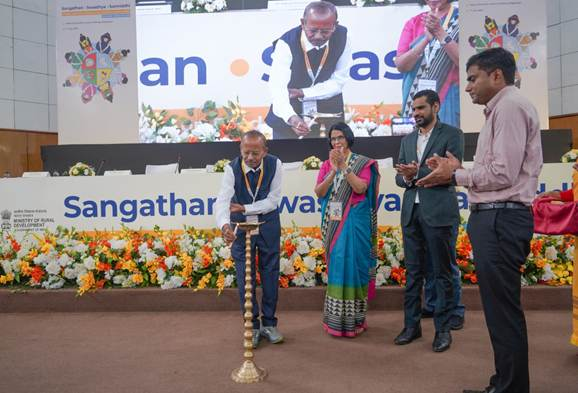Women-Led Rural Transformation: Need for Strengthening SHG-led FNHW Interventions Stressed
The workshop aimed to deepen SHG-led FNHW interventions within the DAY-NRLM framework, fostering convergence with line departments, Civil Society Organizations (CSOs), and communities.

- Country:
- India
The Deendayal Antyodaya Yojana – National Rural Livelihoods Mission (DAY-NRLM), under the Ministry of Rural Development (MoRD), Government of India, in collaboration with the State Rural Livelihoods Mission (SRLM) of Meghalaya, hosted a landmark two-day Regional Workshop titled “Sangathan, Swasthya, Samriddhi: Women Collectives’ Action on Food, Nutrition, Health & WASH (FNHW)” on June 30 and July 1, 2025, in Shillong, Meghalaya.
This event brought together key stakeholders from 16 states to deliberate and learn from innovative community-led interventions that integrate Food, Nutrition, Health, and WASH into the broader rural livelihoods strategy, with Self-Help Groups (SHGs) and their federations at the helm.
Strengthening SHG-Led Health and Nutrition Interventions
The workshop aimed to deepen SHG-led FNHW interventions within the DAY-NRLM framework, fostering convergence with line departments, Civil Society Organizations (CSOs), and communities. It emphasized scaling effective practices, field-based innovations, and institutionalizing mechanisms for inclusive development.
Eminent Participation and Dignitary Insights
The event witnessed participation from senior government officials including:
-
Shri N.N. Sinha, Former Secretary, Government of India
-
Smt. Smriti Sharan, Joint Secretary, MoRD
-
Shri Ramakrishna Chitturi, CEO, SRLM Meghalaya
-
Shri Sibhy C. Sadhu, Director, C&RD, Meghalaya
Senior MoRD officials, State Mission Directors, CEOs, COOs, FNHW State In-Charges, Cluster Level Federation (CLF) leaders, and Community Resource Persons (CRPs) from 16 states also attended, including Assam, Tamil Nadu, Kerala, Odisha, Nagaland, and Tripura.
Day 1: Immersive Field Visits in East Khasi Hills
Participants undertook field visits to Laitkroh and Bholaganj Blocks in East Khasi Hills to observe grassroots innovations:
-
Community Transit Homes supporting institutional deliveries
-
Agri-Nutrition Gardens cultivated by women collectives
-
Baby Shower Demonstrations promoting maternal health awareness
-
Lakhpati Didis engaged in multi-thematic livelihoods
-
Gender and Health Champions (CGHAs) leading awareness on sanitation, nutrition, and rights
These visits enabled real-time interactions with community leaders, SHGs, and CGHAs, offering insights into Meghalaya’s localized, convergence-based models for rural health and economic empowerment.
Day 2: Inaugural and Thematic Deliberations
The second day began with the official inauguration and the launch of a CGHA uniform, reinforcing visual identity and unity in grassroots health leadership.
Key sessions included:
-
Experience sharing by states like Assam, Tripura, and Tamil Nadu
-
CRP reflections on field interventions
-
Panel discussions on state-specific models of FNHW integration
-
Exhibition of IEC materials, local health products, and SHG-led initiatives, curated by community leaders and CRPs for peer learning
Vision for a Healthier, Inclusive Viksit Bharat
Shri N.N. Sinha stressed the importance of prioritizing human development alongside infrastructure. He praised SHGs as powerful agents for last-mile service delivery and behavioral change, particularly in preventive healthcare for vulnerable populations.
Smt. Smriti Sharan described CGHAs as “warriors in purple capes,” commending their leadership in improving maternal and child health. She highlighted the need for role clarity, convergence, and scaling across all SRLMs.
Shri Ramakrishna Chitturi shared Meghalaya’s transformative journey through community-led transit homes, VO-managed Vulnerability Reduction Funds (VRFs), and how such efforts have driven a 91% drop in Severe Acute Malnutrition (SAM) cases.
Shri Sibhy C. Sadhu acknowledged the paradox of matrilineal systems still being male-dominated in governance. He advocated for structured women’s participation and reservations to correct the imbalance.
Cross-State Learning: Success Stories and Innovations
-
Assam’s Dasasutra Model emphasized SBCC, capacity building, and convergence. Notable impacts include an 88% reduction in child marriage and a 33% drop in maternal mortality. Initiatives such as matka incinerators, breastfeeding corners, and tobacco-free villages were showcased.
-
Tamil Nadu highlighted nutri-enterprises, millet cafés, and SHG convergence with health departments via women health volunteers.
-
Nagaland’s Lakhpati model demonstrated SHG-led health and income convergence strategies.
-
Tripura emphasized grassroots coordination, SHG-driven health promotion, and preventive care as essential to realizing the Viksit Bharat 2047 vision.
Spotlight on Elderly and Care Economy
With India’s rural elderly population increasing, a special session highlighted the urgency of social security and elder care.
-
HelpAge India presented a pyramid model combining Elderly SHGs, telemedicine, and mobile units.
-
Kerala’s Kudumbashree shared experiences on care economy innovations including K4 Care, Saantwanam, and BUDS institutions for intellectually disabled persons.
-
Assistive technologies under the STRIDE program and community-integrated elder care models reflected Kerala’s deep commitment to inclusive development.
Outcomes and Way Forward
The workshop drew upon insights from the National Conclave on FNHW 2024, emphasizing action plans that embed FNHW into institutional frameworks, enhance community-based capacity building, and strengthen convergence platforms.
States like Assam and Kerala showcased clear pathways for integrating care and nutrition services into rural livelihoods, proving that SHG-led models can be scaled to create resilient, inclusive, and health-empowered communities.
The “Sangathan, Swasthya, Samriddhi” regional workshop reflected the power of collective women-led action in transforming rural health, nutrition, and livelihoods. By investing in SHGs, CRPs, and community convergence models, India is building the foundation for a Viksit Bharat that is inclusive, healthy, and empowered from the grassroots up.
ALSO READ
Yeast Power Revolutionizes Nutrition: Angel Yeast's Sustainable Solutions
US-Pakistan Relations: A Strategic Convergence Unfolds at the White House
Sampre Nutritions Eyes Expansion with New Fundraising Plans
Kangna Ranaut's Nutritional Initiative in Kullu
How Human Capital and Financial Systems Accelerate Convergence in Global Economies










